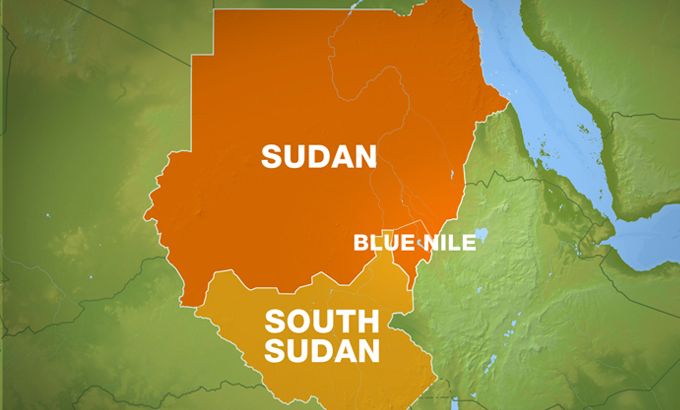Sudan declares emergency in Blue Nile state
Thousands of residents flee Blue Nile state, as violence escalates between the Sudanese army and south-aligned forces.

Sudan’s government has announced a state of emergency in Blue Nile and said it was appointing a military ruler for the state, the official news agency SUNA.
The desicion on Friday followed clashes between Sudan’s army and forces aligned to South Sudan in the area.
Al-Sowarmy Khalid Saad, a Sudanese army spokesman, said SPLM forces attacked Sudan’s army in and around al-Damazin, the state capital, late on Thursday.
The army responded and was now in control, he said.
Khartoum also said it had dismissed the state governor, who is a member of the SPLM’s northern branch, and the SPLM condemned the decision to fire the governor.
Malik Agar, Blue Nile’s governor, told the Reuters news agency before the decision to relieve him of his post was announced, that “The Sudanese army started the attack on our positions”.
He accused Khartoum of planning the attack because it moved soldiers and 12 tanks to al-Damazin shortly before the clashes.
Agar also said the Sudanese government launched air raids on an area around the Blue Nile town of Kormok, and that a woman and a child were killed.
Another SPLM official said four had been killed in aerial attacks, including two women.
Mass flight
Friday’s violence prompted what witnesses said was an exodus of people from the capital of Sudan’s Blue Nile state, which is home to many supporters of the south’s dominant Sudan People’s Liberation Movement (SPLM).
Khartoum has previously threatened to disarm southern-aligned fighters in the state.
Witnesses contacted by telephone said thousands of residents fled al-Damazin, the state capital, where clashes erupted.
An SPLM official said there was a “massive” movement of people but there was no immediate official comment on any exodus.
UN Secretary-General Ban Ki-moon voiced alarm at violence.
A UN statement said that Ban was “deeply concerned about the deterioration of the security situation in Southern Kordofan and the eruption of fighting in Blue Nile State,
“The Secretary-General urges the parties to immediately cease all hostilities and allow access to the humanitarian agencies to all affected areas,” the statement added.
UN peacekeepers who used to patrol the north-south border are pulling out because Khartoum withdrew its consent.
The mandate for the 10,000-strong blue-helmeted UNMIS force, which is separate from a joint UN-African Union force in Darfur, lapsed on July 9 and has not been renewed.
Barnaba Benjamin, South Sudan’s minister of information, told Al Jazeera, “It is an unfortunate situation … There is a peaceful roadmap already agreed”.
Benjamin said the south was “not giving support, material or otherwise, to South Kordofan or Blue Nile” and that “all we have is to establish peaceful relations with the Republic of Sudan”.
Cross-border tensions
Similar clashes and mutual accusations about who was to blame have led to an escalation in violence in South Kordofan, another state in the north that is on the southern border.
Thousands previously fled violence in another hotspot, Abyei.
Agar earlier told SUNA clashes erupted on Thursday night between the SPLM-aligned forces at the entrance of al-Damazin and the Sudanese army forces and then spread.
South Sudan split from the rest of the country in July after a referendum on secession, part of the 2005 peace deal that ended decades of conflict between north and south.
The separation was relatively smooth but tensions simmer.
Under the 2005 deal, residents of Blue Nile and South Kordofan were offered “popular consultations” to determine ties to Khartoum but these have not been completed.
“[Khartoum’s] objective is to knock out the SPLM-North before they become a serious military force,” Chris Phillips of the Economist Intelligence Unit said.
He said Khartoum might see the group as a new secessionist threat to Sudan, which also faces a rebellion in Darfur.
Yasir Arman, secretary-general of the SPLM’s northern branch, said in a statement that the Sudanese army attacked the residence of Al-Jundi Suleiman, commander of the joint integrated units in Blue Nile, and then other areas.
One observer who has worked in Blue Nile and the south said southern-aligned forces in Blue Nile were indigenous to the region and, unlike southern army units that had to move south after secession, these units could not be moved out.